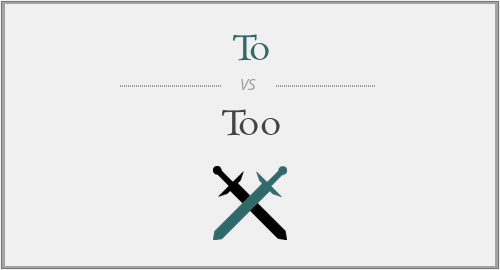To vs. Too
Grammatically, the key difference between “to” and “too” is easy to remember and understand. “To” is a preposition, whereas “too” is an adverb. Short and simple explanations so far! But the more complex part is yet to come...
The real confusion around “to” and “too” occurs when trying to remember all the different definitions they hold, as well as all the different contexts in which they appear. While “too” only has two different possible meanings, therefore being reasonably easy to remember, the shorter word “to”, is in fact the complicated one, with multiple meanings and uses. So let’s discuss them all below in order to get a clear picture of when to use “to” or “too” in your written work.
When do we use “to”?
The first two primary, simple, and easy to remember meanings of “to” as a preposition are either as part of the infinitive construction, as “to” is placed before a verb in order to create the infinitive form, or as a preposition used to explain an objective or the reason behind an action/behind doing something.
Further, “to” can also be used as a preposition in a variety of circumstances to indicate the subject:
- direction (used when indicating something in the direction of something else)
- indicating a person (used when indicating the person who is going to experience or receive something else),
- a position (used to describe a position when something faces a certain place), comparison (used when comparing two distinct things),
- the opinion of someone (used to illustrate someone else’s opinion on something),
- belonging (used before an object that belongs to, or is connected with something else).
- The same preposition, “to”, can be used as a synonym either for “before” in the context of telling time, placed in front of the hour when reading what time it is, or for “until”, used before a particular time or state until something happens.
Check out the examples below, illustrating all these different meanings in sentences:
Example 1: Do you want to play with the other children? – “to”, placed before a verb, is part of the infinitive construction.
Example 2: I’m at his place just to check on his emotional health at the moment. – “to” can also be used to explain the objective or reason behind doing something.
Example 3: She ran to the window in less than three seconds when she heard the sound. – “to” can express the direction when indicating something.

Example 4: Please give these documents to Jack, will you? – “to” may refer to another person who is going to receive or experience something.
Example 5: She stood with her face to the door. – “to” can describe a position, when someone faces a certain place or direction.
Example 6: I always prefer swimming to running. – “to” can be used in the context of comparison, comparing two different things.
Example 7: All her suffering meant nothing to her parents. – “to” may be used to illustrate someone’s opinion on something.
Example 8: I can’t find the keys to my home. – “to” can also express connection between things, in this case the belonging of the keys to a home.
Example 9: It’s ten to eight (o’clock). – “to” can also be a synonym for “before”, when telling the time left until (or before) a certain hour.
Example 10: There’s only one month to go until my graduation party. – lastly, “to” may also be a synonym for “until”, used before a particular time until something is going to happen or take place.
When do we use “too”?
With considerably fewer meanings and contexts than “to”, “too” is easier to remember. Always used as an adverb, “too”, may either be used to describe an excessive amount or more than necessary – in this case, it is placed before other adjectives and adverbs.
“Too” is also a perfect synonym for “also”. Check out the examples below which better illustrate these two meanings.
Example 1: Isn’t this too much milk for this recipe? – used in this structure, “too” refers to more than necessary.
Example 2: I want to go to that party too! – “too” may also be used instead of “also”, with the same meaning.
Conclusion
“To” and “too” are used interchangeably all the time. But they shouldn’t be... The confusion between the two is easy to make due to their identical pronunciation and similar spelling, yet the best and easiest way to remember is that “to” is a short preposition with a variety of applications, whereas “too” is an adverb with two distinct meanings. If you struggle to remember all the various uses, and feel like it’s overwhelming – no problem! Feel free to come back and check this article with the examples provided every time you need to be clear!




Have a discussion about this article with the community:
Report Comment
We're doing our best to make sure our content is useful, accurate and safe.
If by any chance you spot an inappropriate comment while navigating through our website please use this form to let us know, and we'll take care of it shortly.
Attachment
You need to be logged in to favorite.
Log In